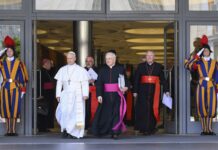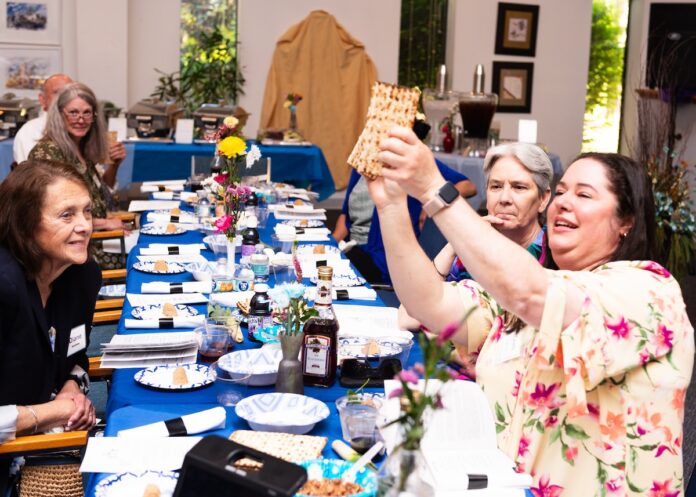
Miriam Rosenberg, president of the Gainesville synagogue, lifted the flattened bread called matzo, dipped it in the sweet apple and nut mixture called charoseth, and added a smidgin of the achingly bitter herbs called “maror,” a combination of beets and pungent horseradish. The assembled group on Wednesday, April 16th, was midway through the Passover Seder, the ceremonial meal observed by most of the 15 million Jews around the world. This was one of the few Seders in North Georgia, though, where the Jewish population is sparse.
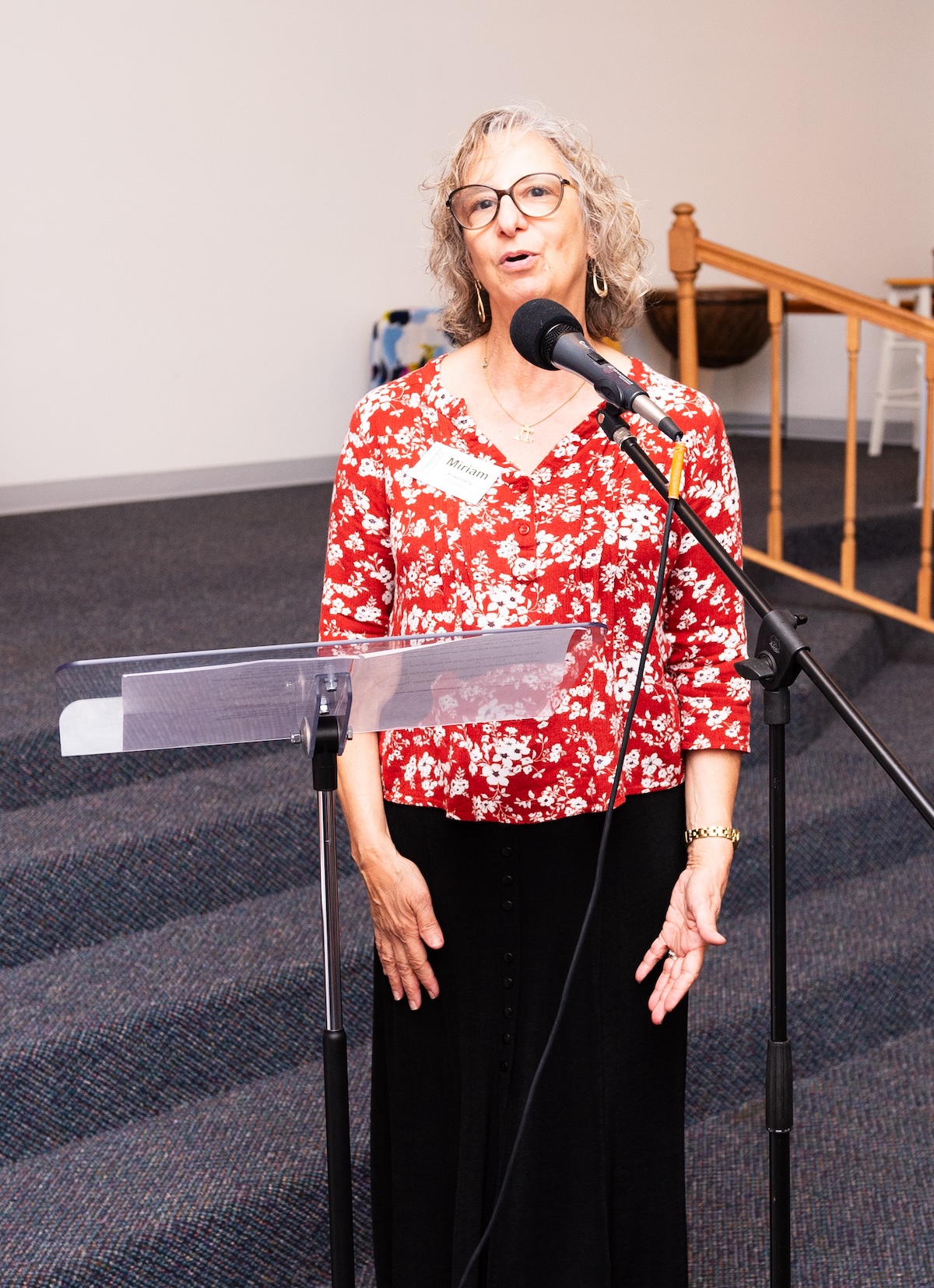
The synagogue, Congregation Shalom B’Harim, rents space in a north Gainesville church, Unity of Gainesville, and meets monthly, usually on Friday nights or Saturday mornings for prayer and community on the Jewish Sabbath. But Passover is a very special occasion.
This year, with Passover spanning April 12-20, some 40 people at Congregation Shalom B’Harim (the name translates “Peace in the Mountains”) met in the sanctuary of the house of worship for the Seder, the ceremonial meal and storytelling ritual that is the centerpiece of the 2000-year-old-plus observance.
According to surveys of Jewish life, Passover may be the most observed of the eight major holidays on the Jewish calendar. Even non-believers say they relate to the holiday’s themes of liberation and freedom, and non-Jews have drawn from these themes as well. The African American spiritual “Let My People Go” refers to the exodus and was one of the many songs sung by the Gainesville group Wednesday night.
Celebrating renewal and freedom
Overseeing his first Seder as spiritual leader of Shalom B’Harim, Rabbi Matan Peled, a Decatur resident, said the holiday holds universal significance for Jews and the wider community. His wife, Cantor Jennifer Peled, provided much of the evening’s music, leading songs—many of them familiar to the congregation- as she strummed her guitar.
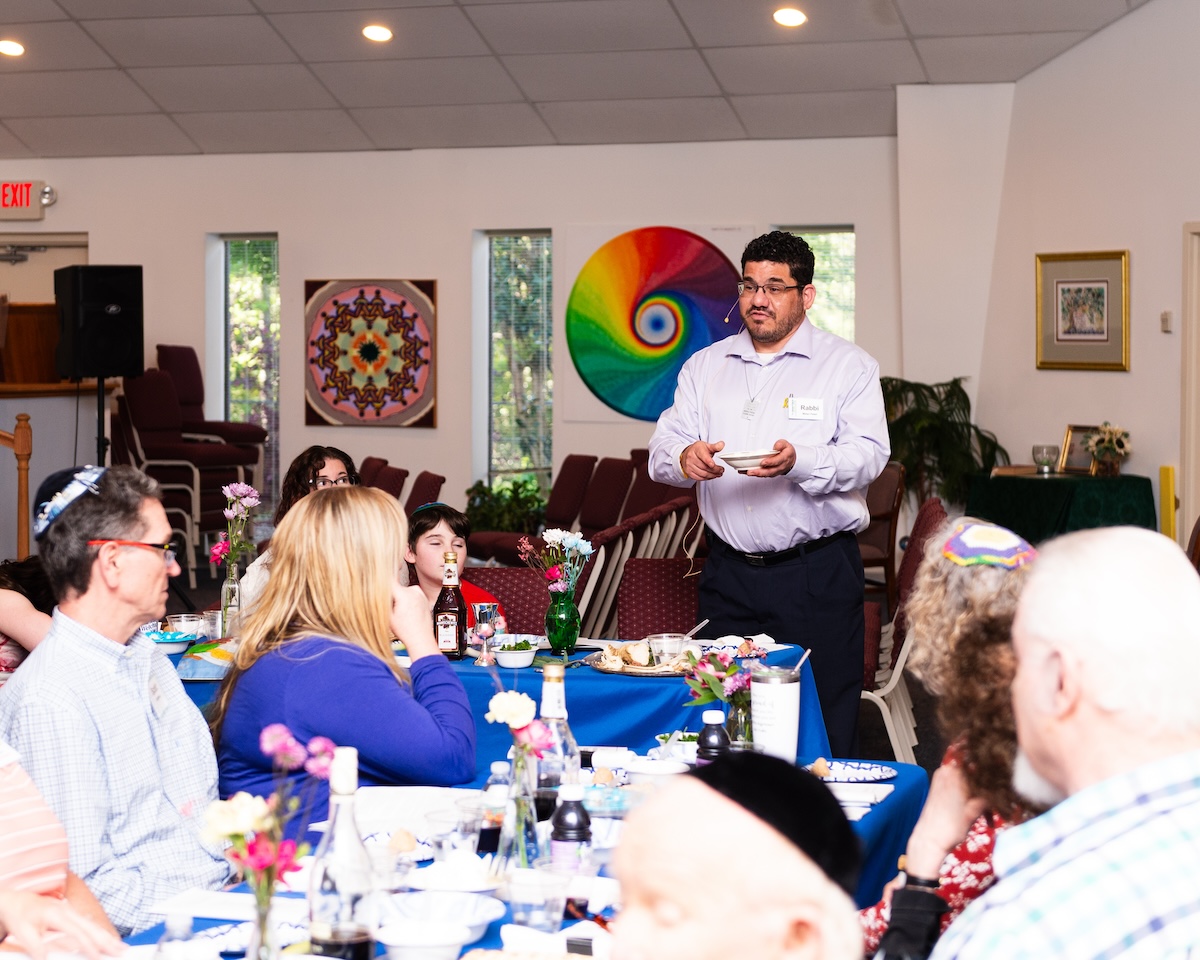
“The Passover holiday symbolizes renewal, new life, and growth,” Rabbi Peled said. “In the days of the First and Second Temples, it used to be one of the three holidays during the year that Jews brought the first fruits to the Temple in Jerusalem to give thanks to God. The second meaning—which is extremely important to our life today—is the going out, the exodus from slavery in Egypt to freedom,” added Peled. “This year, it takes on an added meaning because of the situation with the Israeli hostages in Gaza. There are still 59 hostages there.”
Passover commemorates the early Hebrews’ escape from slavery in Egypt, as related in the Biblical book of Exodus (and in the 1956 Charlton Heston movie, “The Ten Commandments.”) The holiday revolves around themes of freedom, a celebration of the miracles described in the Biblical story, and the renewal connected to its occurrence in the early days of spring and the planting of crops in the Holy Land.
Symbolism of ceremonial foods
Because the Jewish calendar operates on both lunar and solar cycles, the Western dates of the eight-day holiday can occur any time between late March and mid-April. Passover commences with the Passover Seder, at which the exodus story is retold out of a book called the Haggadah (“the telling”), and various foods contribute to the commemoration.
The unleavened, flat matzo reminds the Jews of the haste with which they had to leave Egypt when the Egyptian Pharaoh finally allowed them to flee after the last and worst of the ten plagues—the sudden death of all the Egyptians’ first-born sons.
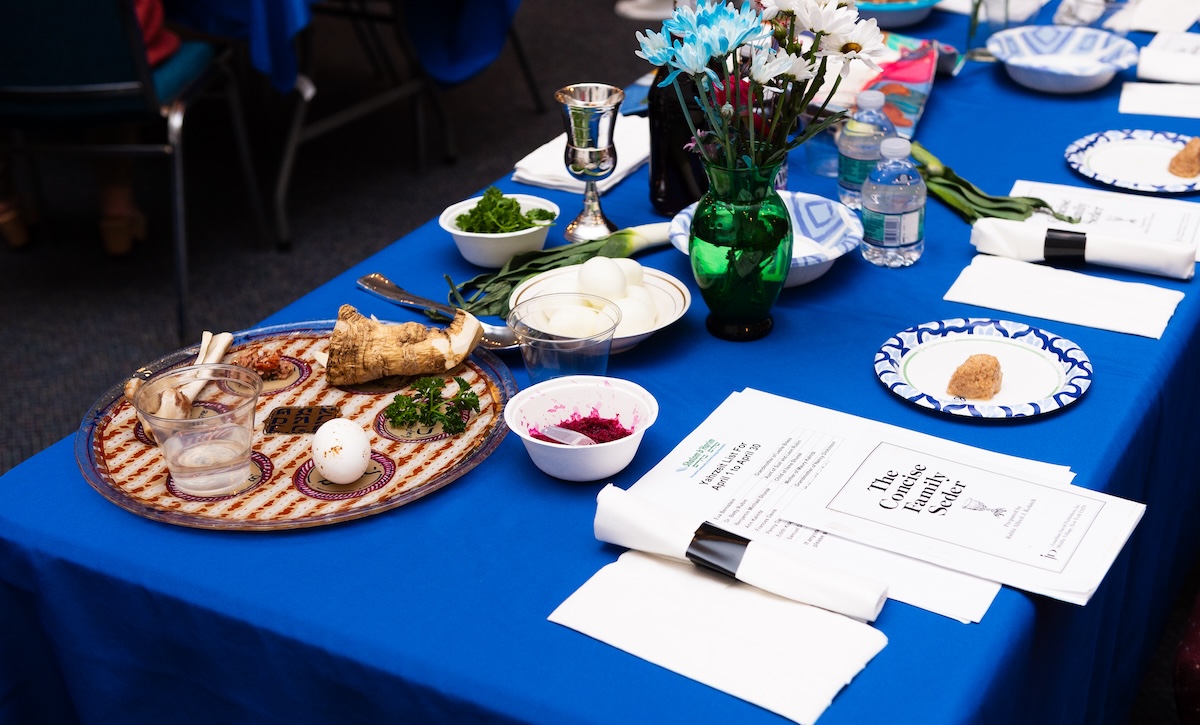
The ceremonial foods also include charoseth—a reddish beige mixture said to be a reminder of the mortar with which the Jews were forced as slaves to build Egypt’s cities; maror, or bitter herbs (usually horseradish) to remind them of the bitterness of their lives as slaves; and saltwater, representing the tears of the Jewish slaves. Other customary foods include hard-boiled eggs, representing the circle of life, and a sprig of parsley, fragrant with the aroma of the season.
On most Seder tables, a lamb’s shank bone is also placed (but not eaten). The bone is a reminder of the Hebrew slaves’ act of smearing their doorposts with the blood of a slain lamb to signify that they were exempt from the tenth and most deadly plague.
Wine, wisdom, and welcome
The Haggadah has some fun moments to keep children (and possibly bored adults) interested. A centerpiece is a four-question Q&A about the holiday, often chanted by the youngest person at the table. On Wednesday, these included the Peleds’ two young children and other children scattered around the room among the mostly older crowd.
At another point, the front door of the home or synagogue is opened to invite a hoped-for visitor—Elijah, the Biblical prophet, whose arrival is believed to be a harbinger of the coming of the Jewish Messiah. Symbolically, he is invited in with a song about him in his honor.
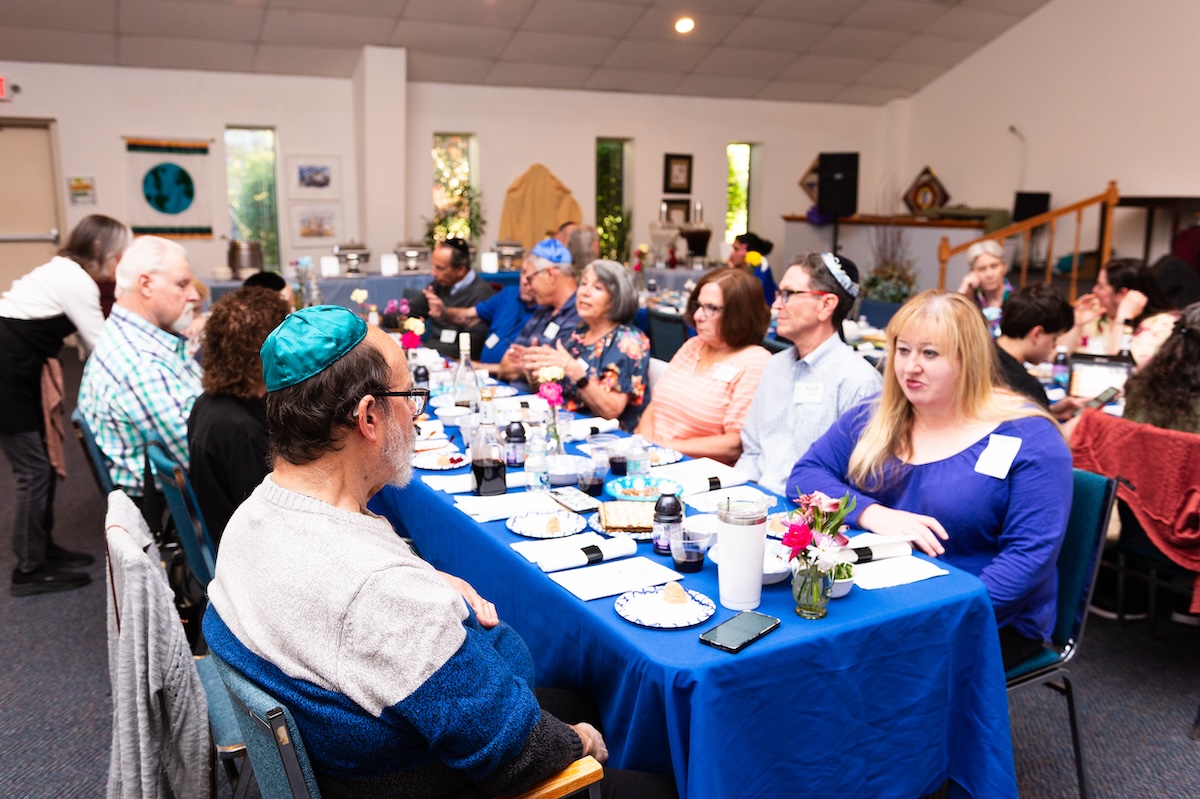
For adults, the meal also includes four cups of wine, spread out through the meal. (Many of the Gainesville crowd, with an eye to the drive home ahead of them, drank quite a bit less than that, and grape juice was also on every table.) Ten drops of the first cup of wine are spilled at one point in the service—a deliberate curtailing of a little of the joy of the holiday in memory of the suffering the Egyptians experienced at God’s hand when, as the Bible relates, Pharaoh repeatedly refused to release the Jewish slaves.
Modern twists observing an ancient truth
Shalom B’Harim annually hosts its community Seder about halfway through the holiday, purposely not on the first nights of the holiday, when most people have their own family and friends to their homes for the ceremony and meal. For the last few years, catering has been supplied by the food services division of Brenau University in Gainesville; the instruction to the cooks specifies the absence of any bread or other leavened grain (chametz, in Hebrew), as these are forbidden to observers of Judaism throughout the holiday, in commemoration of the rapid departure from Egypt. The menu on Wednesday: beef brisket, chicken, potato kugel (a dense pudding), and roasted vegetables. Dessert was fruit and a heavy, flourless, chocolate cake.
Cantor Peled “played” with some of the traditional Seder music, introducing variations like a parody of the Mary Wells Motown Hit “My Guy,” telling the story with the congregation chiming in the key word “Sinai,” where Wells sang “My Guy.” It was, of course, at Mount Sinai in the desert, just seven weeks after the exodus, that the Jews are believed to have received the Torah (the first five books of the Hebrew Bible) from God.
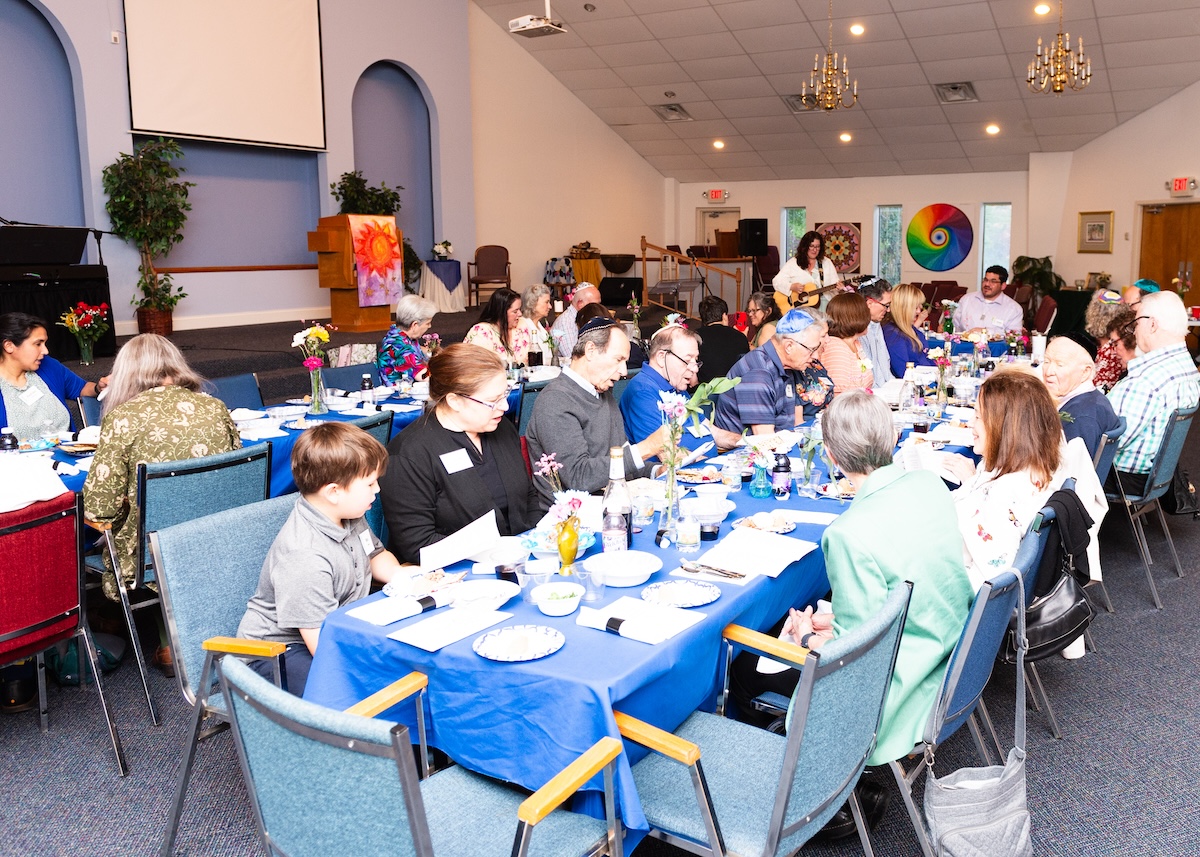
Another departure from the musical norm began with the Broadway hit Wicked song “Defying Gravity,” substituting Peled’s words as the Jews “Defying Slavery.” With the help of lyrics projected onto the synagogue wall, the congregation happily chimed in.
In an interview, Matan Peled said that the holiday resounds with meaning, even for some non-Jews.
“It’s about a spiritual awakening,” he said. “We celebrate and thank God for enabling us to enjoy this time, the fruits of our labor, and His acts of creation. And freedom… Nobody is a possession of anybody else; we are all created in the image of God, and we are all entitled to the same freedom to be who we are.”


